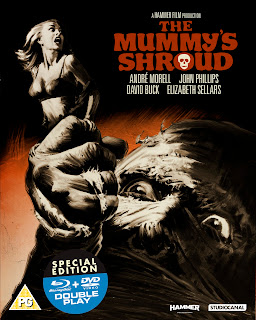Rasputin (1966)
Rasputin, a holy man with the power to heal the sick, slowly
makes his way through pre-revolution Russia towards St Petersburg with the sole
intent of working his way towards the Tsars, his ruthless pursuit of wealth and
power mark him as a danger to all those who stand in his way.
One of
Hammer’s many historical-epics-on-a-tight-budget, Rasputin starring Christopher Lee as the infamous holy
man-cum-mad-man is handled with diligent care and mindfulness to its
capabilities. In less skilled hands the film could have appeared over-reaching,
but with a solid cast and careful scripting it keeps its focus on character.
It’s
important that the film be labelled as a historic drama with a dark side (what
history doesn’t have a dark side?) as opposed to Hammer’s typical horror, to
label this a horror movie feels somewhat criminal and dismissive. The thing that
constantly amazes is Lee’s wonderful performance as the boisterous, brutish,
subtle, and manipulative Rasputin. Never
before, and possibly after, has Lee achieved that range of character; his
ability to slip between the mad monk’s many faces is the prize of the feature
and the staple that holds it together. The film does unfortunately waver at points,
losing its focus or drifting into less arresting grounds, but on the whole it’s
an enjoyable a and unwholesome affair.
The Mummy’s Shroud (1967)
The Mummy’s Shroud
is perhaps the most bipolar in terms of quality out the three releases, at its
best points it appears quant, romantic even, adventurous, and unsettling, yet
on the other hand it can seem amateur and messy. The third of Hammer’s Mummy films, Shroud allows itself to become victim to
tedious writing, the typical story of “archaeologists warned against their
escapades, unleash terror on themselves”, seems the basis for just about every
Mummy film in existence. If you ignore the recycled narrative then the film can
still thrill.
Once
the Mummy is awakened the film breathes new life into itself picking up pace.
The Mummy scenes are actually quite vicious; Eddie Powell’s (Christopher Lee’s
regular stunt double) slow cumbersome movements and the brutality of his
Mummy’s attacks foresee a time when monsters like Michael Myers and Jason Voorhees
would rule the screens. A fantastic climax leaves the film in good standing,
but one can’t help but wish the rest of the film achieved that level of
excitement.
There
are glimpses of style and suspense but too few to mark the film out, this along
with the fact the feature is mostly a few tense scenes strung together with a
lack of real grit, lure the film into a middle ground of average horror.
Directed by: John Gilling Cast:
André Morell, John Phillips , David Buck
The Devil Rides Out (1968)
One of the truly great Hammer contributions to cinema, The Devil Rides Out is an exercise in
perfect occult horror. Adapted by Richard Matheson from a Dennis Wheatley
novel, the film follows two old friends, The Duc de Richleau (Christopher Lee)
and Rex Van Ryn(Leon Greene) as they try to rescue a deceased friend’s’ son from
the clutches of a satanic cult. The cult, led by the diabolic Mocata (Charles
Gray), will stop at nothing to retrieve the young man and punish those who
crossed them.
Jumping
straight to the point is a key factor in the films’ success; the story keeps
the characters moving and never takes a dull or pointless turn. A stellar
performance from Lee (one of his very best, and personal favourites) ensures
that the plot is guided carefully around any possibly ridiculous devices. One
of the key strengths of the piece is Lee’s polar relationship to Gray’s equally
mesmerising Mocata, the two play out a battle of wits whilst rarely sharing any
actual screen time. The action is kept
in check, the plot is gripping, the Wicker
man vibe is strong and helps put a stamp of purely British terror on the
feature, plus there are more than a few genuinely unnerving scenes.
The film is frequently criticised for its disappointing visual effects, but apart from a dodgy spider gag the effects work pretty damn well. The appearance of the actual Devil is a terrifying visitation thanks to some brutally unattractive make-up, as is the appearance of the Angel of Death, things that out of context could seem dated, but given the sharpness of the script and Terence Fisher’s tight direction pulls off smoothly.
The film is frequently criticised for its disappointing visual effects, but apart from a dodgy spider gag the effects work pretty damn well. The appearance of the actual Devil is a terrifying visitation thanks to some brutally unattractive make-up, as is the appearance of the Angel of Death, things that out of context could seem dated, but given the sharpness of the script and Terence Fisher’s tight direction pulls off smoothly.
Few
Hammer films achieve the crisp and startling quality of this piece after all
these years, and even fewer are almost faultless. The Devil Rides Out is not just a fantastic example of Hammer’s capabilities,
but a perfect alignment of those qualities that evade most horror productions;
a stellar script, perfect cast, and genuine thrills.





No comments:
Post a Comment